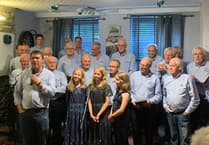A new opera about one of Wales’ best known legends will premiere at a top music festival this weekend.
There will be two performances of the community opera, Gelert, at the North Wales International Music Festival this Saturday, 24 September.
The music has been composed by Prof Paul Mealor, and the words written by his regular collaborator, the eminent poet, Dr Grahame Davies.
In another first, the opera has been written in Welsh and English and will be staged in both languages at the festival’s usual venue, St Asaph Cathedral, this Saturday, with a matinee performance in Welsh and an evening performance in English with a BSL interpreter.
It will be sung by the NEW Voices community chorus, Kana Chamber Choir, and soloists Trystan Lewis, Dafydd Jones and Lisa Dafydd, who will be accompanied by the festival’s resident orchestra, Wrexham-based NEW Sinfonia.
Lisa recently won the prestigious Osborne Roberts Blue Riband at the National Eisteddfod in Tregaron.
The opera has been dedicated to the festival’s artistic director, Ann Atkinson, who commissioned it as part of the event’s Golden Jubilee celebrations.
It tells the tale of the eponymous dog which gave its name to the village of Beddgelert (Gelert’s grave) in Gwynedd.
According to legend, Prince Llywelyn the Great returns from hunting to find his baby missing, the cradle overturned and his faithful hound, Gelert, with a blood-smeared mouth.
Wrongly assuming the dog had attacked his son, Llywelyn killed Gelert only to discover his son safe and well under the crib.
Nearby he found the body of an enormous wolf that had been killed by Gelert who had courageously defended the infant.
Paul said: “Gelert is where opera meets musical theatre.
“When people see the word opera they think of Tosca or something like that. This is nothing like it. It’s very melodic and it’s not going to shock anyone with weird sound effects.
“It’s not high opera at all, it’s more like Les Misérables or Miss Saigon. People going to it expecting to be entertained will be, I think.
“It is a community opera so anyone can sing the parts and Gelert can be performed by any amateur group.”
He said: “It will be performed in both Welsh and then, later, in English which is fabulous. I speak a bit of Welsh but I’m not fluent in it but it’s Grahame’s first language and he’s highlighted the way that both languages lilt.
“I think this is the first time this has ever been done. In the past I think operas were translated into Welsh or from Welsh into English later. I don’t think an opera has ever been written with performances in both languages in mind before.”
Both Paul and Grahame said the lyrics always come first when they collaborate on a project.
Grahame said: “We sit and talk and with Gelert I wrote the story and Paul set about writing the music. He’ll get back to me and say this part needs to change to fit musically and it gets changed.
Paul added: “Music carries the drama of the text, especially in opera so we do a lot of to-ing and fro-ing. But Grahame writes so lyrically it makes it easier for me because the music is already in the text.”
“Our opera starts with Prince Llywelyn as an old man looking back at the mistakes and regrets in his life. His biggest regret is killing Gelert, his greatest friend, in anger and in mistake.
“Grahame and I started discussing about how he can repay the dog for saving his son’s life and how he can ever have forgiveness. The idea in the opera is that Gelert appears to him and forgives him. It’s about redemption really and asking for forgiveness and getting it.”
According to Grahame, there is one element of the story that never gets mentioned and that’s the wolf.
He said: “So in the opera we give him a voice. Wolves are always painted as the baddies but in fact the wolf was only looking for food. He didn’t know who this baby was so he’s not a baddie and gets a chance to speak and right some wrongs. This opera challenges some stereotypes.”
Festival director Ann Atkinson said: “The publishers sent me the score [of Gelert] and when I saw it had been dedicated to me, I was pleasantly surprised Paul had done that. I was very touched.
“This year’s programme reflects the past 50 years of the festival and there are some wonderful concerts in store.”
The festival started on Saturday, 17 September, and runs until 1 October.
More details can be found online at www.nwimf.com




